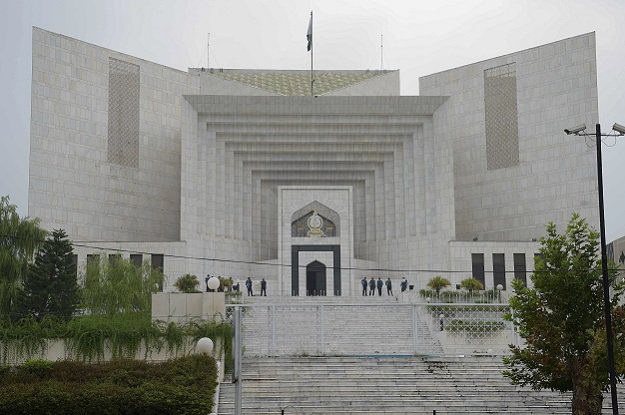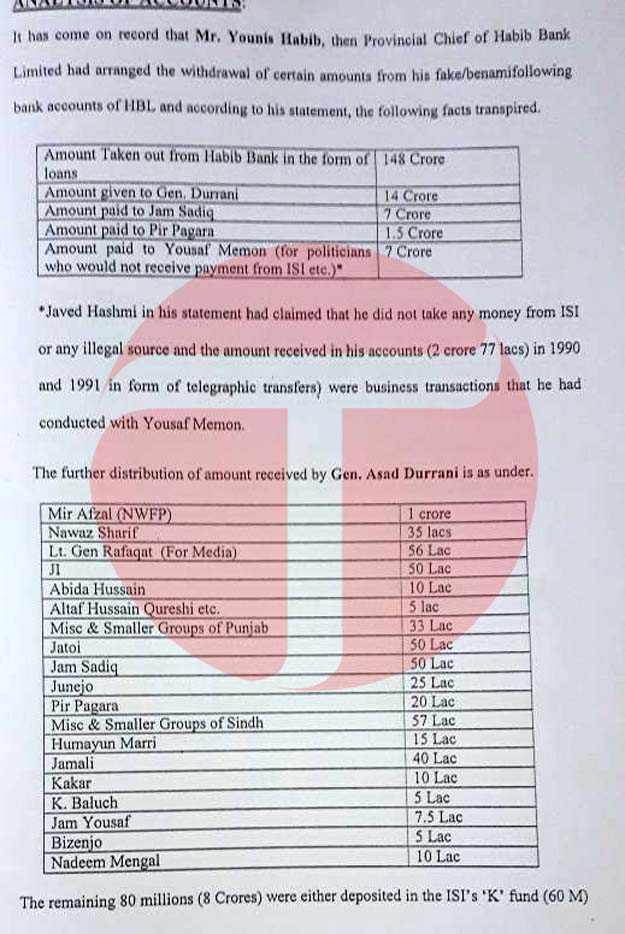
A report submitted to the top court by FIA DG Bashir Memon says it is evident that money was taken out of bank accounts illegally and is alleged to have been distributed among civil persons, including politicians. But since all the alleged recipients questioned by the FIA have denied taking the money, it has given rise to a situation of one person’s word against another’s, says the report.
According to the report, the enquiry can only be finalised once detailed statements, records, receipts and modes of payment to civilians, including politicians, are provided by the two retired generals.
Presently, no evidence has been provided by anyone, says the report, adding that the two had taken pleas that their review petitions were pending with the Supreme Court. Since the review petitions have now been dismissed, both will be summoned for finalising the enquiry in line with the directions of the Supreme Court, it adds.
However, it is submitted that no oral or documentary evidence has come on record regarding the alleged receipt of monies by the politicians, says the FIA report.
Govt faces uphill battle in Asghar Khan case
It adds that withdrawals of Rs140.475 million took place during the period between September 16, 1990 and October 22, 1990 from 15 accounts and the money was subsequently deposited in six accounts.
The FIA says it has recorded the statements of 18 persons including former prime minister Nawaz Sharif, Javed Hashmi, Mustafa Khar and Abida Hussain.
According to the report, Hashmi says he did not get money from these accounts but rather was wired an amount of Rs22.77million in 1990 as part of a business transaction he had conducted with Yousaf Memon.
Earlier, in a newspaper interview, Abida had admitted receiving a ‘small amount of money’, but said she thought it was part of an ‘above board’ election fund.
Meanwhile, the Supreme Court on Tuesday gave the federal government a week to outline actions against former army chief Beg and former ISI head Durrani in view of the 2013 verdict in the Asghar Khan case.
A four-judge bench of the top court, headed by Chief Justice of Pakistan (CJP) Mian Saqib Nisar, had sought a reply from the federal government regarding implementation on its 2012 verdict, which may also have implications for Sharif, the deposed premier.
The government should decide how it would proceed against the two officers, observed the bench. It also asked why high treason proceedings under Article 6 of the Constitution could not be initiated against them.
Declining Attorney General for Pakistan Ashtar Ausaf Ali’s request seeking two weeks for the government to outline a procedure, the apex court noted that the tenure of the ruling set-up was ending in three weeks, and a special meeting of the cabinet can be summoned to take a decision on the matter.
Salman Akram Raja, the counsel for the petitioner, said since the case was a subversion of the Constitution by two military officers in view of the 2012 judgment, high treason proceedings should be initiated against them.
The attorney-general said statements of both the officials should be recorded to enquire the nature of the offence.
“It is a corrupt practice,” replied the CJP, adding that it was for the federal government to decide about initiating action against the military officers. He referred to the former military ruler Pervez Musharraf’s case and said that the SC had also sent his matter to the government for initiating action against him.
When Raja stated that the SC gave a landmark judgment in the Asghar Khan case, the bench noted that he must give credit to the present SC for digging out the long-pending matter and asked the executive to execute the verdict.
The CJP also warned senior lawyers not to appear on the TV for commenting on the cases wherein they are appearing as counsel on behalf of any party.
On Monday, the Supreme Court dismissed a review petition filed by Beg and Durrani against the judgment ordering action against them for distributing millions of rupees among politicians opposed to the PPP ahead of the 1990 general elections.
Aslam Beg’s review plea in Asghar Khan case rejected
Background
On June 16, 1996, Asghar Khan wrote a letter to then CJP Sajjad Ali Shah which contained names of politicians who had allegedly received money from the ISI ahead of the 1990 polls. The fund was provided by Younas Habib, the chief executive officer of Habib Bank Limited (HBL), then a government bank.
According to the letter, Nawaz Sharif had allegedly received Rs3.5 million, Mir Afzal Khan Rs10 million, Lt Gen Rafaqat Rs5.6 million [for distributing among journalists], Abida Hussain Rs1 million, Jamaat-e-Islami Rs5 million, and senior journalist Altaf Hussain Qureshi Rs500,000.
In Sindh, Ghulam Mustafa Jatoi received Rs5 million, Jam Sadiq Rs5 million, Muhammad Khan Junejo Rs250,000, Pir Pagara Rs2 million, Maulana Salahuddin Rs300,000 and other small groups in Sindh Rs5.4 million.
In Balochistan, Humayun Marri received Rs1.5 million. The letter also contained the names of Bizenjo and Kakar tribes.
The SC had, in its verdict, said former president Ghulam Ishaq Khan, former army chief Beg and ex-ISI chief Durrani acted in violation of the Constitution by facilitating a group of politicians and political parties, to ensure their success against rival candidates in the 1990 general elections.
The court verdict had said that president, being head of the state in the parliamentary system of government, represents unity of the republic under Article 41 of the Constitution; and according to the oath of his office, he will do right to all manner of people, according to law, without fear or favour, affection or ill-will.
The seven-page short order, authored by former CJP Iftikhar Chaudhry, said, “Any Election Cell/Political Cell in Presidency or ISI or MI [Military Intelligence] or within their formations shall be abolished immediately and any letter/notification to the extent of creating any such Cell/Department (by any name whatsoever, explained herein, shall stand cancelled forthwith.”
The court also held that the involvement of the officers or members of secret agencies in unlawful activities, individually or collectively called for strict action ‘being, violative of oath of their offices’, and if involved, they are liable to be dealt with under the Constitution and the Law.
“The citizens of Pakistan as a matter of right are free to elect their representatives in an election process being conducted honestly, justly, fairly and in accordance with the law,” it had said.

1718870162-0/BeFunky-collage-(60)1718870162-0-405x300.webp)
1730504285-0/Martha-(1)1730504285-0-165x106.webp)




1732340798-0/BeFunk_§_]__-(35)1732340798-0.jpg)










COMMENTS (1)
Comments are moderated and generally will be posted if they are on-topic and not abusive.
For more information, please see our Comments FAQ